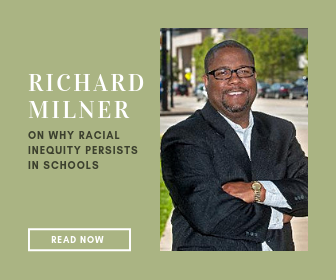Written by Anthony Rebora
H. Richard Milner IV, a professor of education at Vanderbilt University and a regular columnist for ASCD’s Educational Leadership, gave the American Education Research Association’s 15th annual Brown Lecture last week in Washington, D.C. The lecture, named after the U.S. Supreme Court’s landmark Brown v. Board decision, is delivered each year by a scholar who has made a significant contribution to research on equality in education.
In his address, Milner, who’s written two influential books on race and education, pulled no punches on the issue of ongoing inequities in schools. He argued that despite the promise of equality harbored in the Brown ruling nearly 65 years ago, common practices and structural conventions in U.S. education have continually resulted in the disenfranchisement of black students and families.
Recalling his own anguished search for a culturally hospitable school his young daughters, Milner said that “disparity and inequity start in preschool” and often grow from there. He held that a primary reason for this has been school systems’ tendency, starting in the years after Brown, to conflate discipline with punishment, particularly for black students.
Healthy discipline in schools, Milner said, is oriented around holding students to high expectations and providing opportunities and support for them to excel, whereas punishment is often a form of exclusion, marginalization, or giving up on a student. He noted that black students are far more likely than other students to be subject to suspensions and to be harshly punished for “subjective infractions.”
Such treatment is often a reflection of a “law-and-order orientation to human behavior” that brands black students “as criminals rather than developing human beings,” Milner said.
Milner suggested that schools’ reliance on exclusionary punishment for black students has roots in the nation’s historical unpreparedness for school integration. “After Brown, we moved and bused bodies around but—get this—without a strategic system to help educators, students, and community members to live and learn across racial lines,” he said.
Milner also noted that the black teaching force has declined in the years since Brown, even as student diversity has increased dramatically, creating greater potential for racial and cultural barriers in schools.
“Research has shown that white teachers can be and are successful [in working with] black students when they develop the knowledge, attitudes, mindsets, dispositions, and consequently the practices to do so,” Milner stressed. “But they do so not [just] because they are good people and not because they have black friends. They do so because they put in the work to be successful.”
Curriculum Concerns
On top of disproportionately punitive disciplinary policies, schools’ curricular practices—which determine “what students have the opportunity to learn”—have also had an exclusionary effect on black students, Milner said. This is particularly the case with what he referred to as the “null curriculum”—the lessons embedded in what schools avoid covering.
Projecting photos of dozens of young black Americans who’d been killed in police violence, Milner suggested that many black students today live with “vicarious trauma” from such incidents but don’t see their own or their communities’ racial experiences and histories reflected in the school curriculum. This type of avoidance does not allow room for their full identities at school and leaves them feeling disconnected, he said.
“Historically and currently, the absence of providing curriculum opportunities that are germane to student success and healing is a form of punishment,” Milner said. “Curriculum is a form of punishment when we don’t provide spaces for students to unpack what’s happening in society.”
In this connection, Milner shared data from a survey he and colleagues have conducted on teachers’ beliefs on discussing race. The survey found that 86 percent of the 386 teachers responding thought that talking about race with students was important, but that only 55 percent of them felt prepared to do so. Only 33 percent, meanwhile, thought it was a good idea to discuss incidents of police racial violence with students.
Milner urged the audience of researchers and educators to be bolder in creating supportive, enabling environments for black students.
“We have a social and emotional responsibility to create systems and structures that ensure that our children have a fighting chance to maximize their capacity and their humanity,” he said. “I hope you will be brave enough and strong enough to disrupt punitive policies and practices.”
Watch a video of Milner’s presentation and a follow-up panel discussion. Milner’s Confronting Inequity column is published each month in Educational Leadership.








